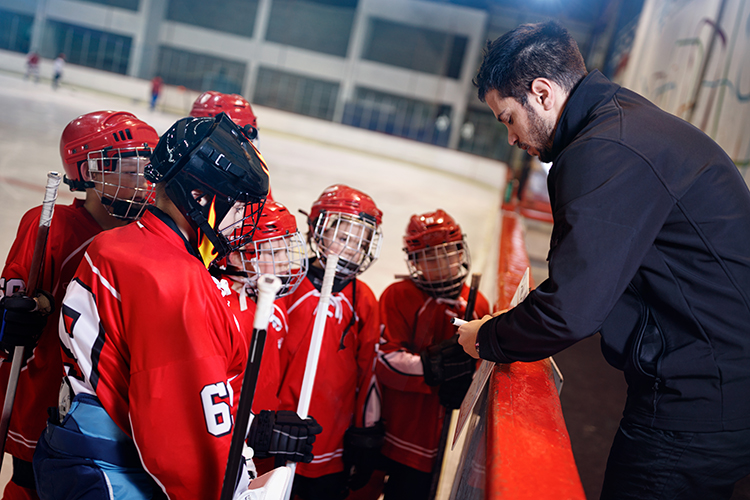
I was watching "Miracle," the movie about the 1980 Olympic hockey team, and I thought a few of the coaching strategies used by Herb Brooks might be helpful when working with youth in their competitions.
First, Coach Brooks worked his players very hard at practices, as he wanted them to be prepared for competition. Preparation was key in their success. Even though they may not have liked all of the hard practices at the time, in the end, they would all agree it was worth the extra effort.
My spin: Practices are hard so the competition can be fun. My practices are long. That is primarily the result of living 300 miles from the youth I coach. If I spend 10 hours on the road, we are going to practice for more than two hours. As a high school and college athlete, I was not a fan of practice, but I lived for the track meets. To do well in competition, effort has to be put forth in practice. The best part of practice was spending time with my teammates as we “suffered” together.
The Russian hockey team soundly defeated the U.S. team a few weeks before the Olympics began. The team experienced what it would be like to play the powerhouse and to lose. While no one likes losing, Brooks wanted his team to know how deep the water was going to be at the Olympics.
My spin: As Brooks told the team the second time they faced the Russians, they might (hypothetically) play them 10 times and lose nine times. But that one time exists and it was going to happen. Every contest, every match is random. There are different cows, different judging officials, and different ideas about what is correct. But, on any given day, the stars can align and the classes just seem so placeable and the reasons just flow. Or the subjects of the quiz bowl questions are in your wheelhouse and your buzzer is on fire. With talent and proper preparation, that philosophical fantasy of a victory can become a reality like it did in Lake Placid.
The U.S. hockey team received a lot of support from their fans. As the movie was reaching its climax, the U.S. team headed to the ice to play the much-feared Russian hockey team, and letters of support lined the walkway. Their hockey sticks tapped the notes as they departed the locker room.
My spin: Every person needs support. It can be emotional or verbal. Knowing others care about your success can motivate people to go beyond what is expected. When I have youth competing for the first time at big events, I have previous participants write them letters of advice and support. I believe it means more coming from someone who has been there and not just my belief in them.
Herb Brooks was relentless about not allowing the media to talk to his players during the Olympics. He wanted them to focus on his words and not be distracted by the naysayers in the media. Many thought it was his way of selfishly focusing attention on himself, but it was to shield his players from the potential outside negativity.
My spin: A coach is to provide guidance and to bring the best out in their team. There will always be those with negative comments trying to discourage or create doubt. Some people just project negativity as easily as they breathe. Brooks wanted his team to not hear the rumblings of “Do you really think you can beat the Russians?” Brooks knew they could win. If he didn’t, Brooks never would have been able to convince his team that they could win. For me, the hardest part to get a team to win a championship is to convince them that they can win. Once that happens, it is an awesome thing to witness as their confidence grows, as does the loyalty to the team.
In the 1980s, professional athletes were not allowed to participate in the Olympics. The 1980 U.S. hockey team was very young, comprised of U.S. college students. Experts were critical that their age would be a detriment against older, more experienced athletes who had been playing together for decades.
My spin: Younger students are the easiest to teach. They want to learn and they respect your knowledge. They soak up information easily — when it is presented in a form they understand. Imagine teaching someone long division without first having a solid grasp on addition, subtraction, and multiplication. Each layer of knowledge needs to be added to a solid foundation beneath it. Before you can teach the fine-tuning techniques of oral reasons, students must understand the parts of the cow and how the scorecard is used. If not, the dots do not connect, and youth is just learning to talk about stuff they do not understand. Unfortunately, that is when they can loose interest because things are “not making sense” or “I don’t get it.”
The enthusiasm a young mind brings can be harnessed to excite everyone they interact with. And that internal motivation can last years if cultivated. It also has the potential to eventually spread to the next generation.
When Brooks was preparing his team to compete against the Russians in the medal round, his motivational words were "Play your game." He did not want them to focus on whom they were playing — the world-dominant Russian team — but play how they were taught.
My spin: Know your strengths and play to them. If you know the written portion is your stronghold, study to widen the gap from your closest competitors so in your weaker disciplines you have a larger cushion to cushion yourself. If you know reasons are your strength, deliver them like you are the official. Own them. The scores will reflect your passion. That is not to say that the challenging aspects of your competition should be ignored. They, too, should be practiced. Ultimately you want a positive message to send your team into competition, so focus on what they do best.
Brooks was developing more than just players. He was developing a team — a family among his players. They had to rely on each other in a team sport. When a top player got hurt, others had to step in until he was ready to perform again.
My spin: It is a team that wins or falls to defeat. While one player may have the most skill, everyone needs to contribute to their best ability. If four team members are all rowing a boat and they are relying on someone else to do the majority of the rowing, the team will never reach its full potential — and at times, some are just in the boat for a ride. To be successful, they need to learn balance and work as a team, so if the stronger member falters, others are there to pull the weight.
The team would win their next competition and earn an Olympic Gold medal. The lessons those players learned en route to their championship on the ice were just as valuable in their careers off the ice. At the conclusion of the movie, "Where they are now" was displayed. In their post-Olympic careers, players enjoyed great success in business, becoming real estate agents, doctors, and even a few coaches.
My spin: While not every youth I coach will someday milk cows, they will have the skills to learn new ideas, speak up for themselves, and work together to achieve great things, whether that is in a barn or a boardroom.

The author is the online media manager and is responsible for the website, webinars, and social media. A graduate of Modesto Junior College and Fresno State, she was raised on a California dairy and frequently blogs on youth programs and consumer issues.








